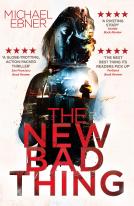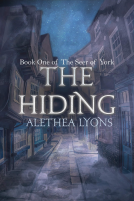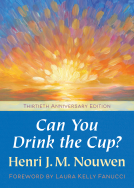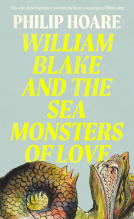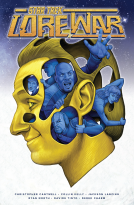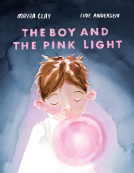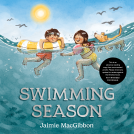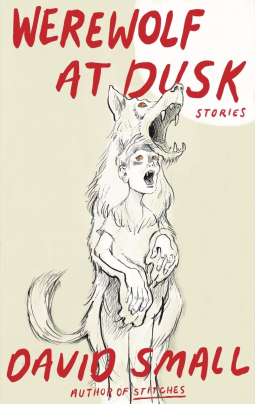
Werewolf at Dusk: And Other Stories
by David Small
This title was previously available on NetGalley and is now archived.
Send NetGalley books directly to your Kindle or Kindle app
1
To read on a Kindle or Kindle app, please add kindle@netgalley.com as an approved email address to receive files in your Amazon account. Click here for step-by-step instructions.
2
Also find your Kindle email address within your Amazon account, and enter it here.
Pub Date 12 Mar 2024 | Archive Date 29 Feb 2024
W. W. Norton & Company | Liveright
Talking about this book? Use #WerewolfatDuskAndOtherStories #NetGalley. More hashtag tips!
Description
Confronting “the beast within” us all, Werewolf at Dusk celebrates the singular genius of David Small, author of the #1 New York Times bestseller Stitches.
Following the internationally acclaimed publication of Stitches, David Small emerged as a storied figure in graphic literature, eliciting comparisons to Stan Lee and Alfred Hitchcock. Werewolf at Dusk, appearing fifteen years later, is his homage to aging—gracefully or otherwise. The three stories in this collection are linked, Small writes, “by the dread of things internal.” In the title story, an adaptation of Lincoln Michel’s much-loved short, the dread is that of a man who has reached old age with something repellant—even bestial—in his nature. The specter of old age also haunts the semi-autobiographical story “A Walk in the Old City,” with its looming spiders and cascading brainmatter—a dreamscape that gives way to the ominous environs of 1930s Berlin in the final story, a reinterpretation of Jean Ferry’s “The Tiger in Vogue.”
As fluid as manga and rife with unsettling imagery, Werewolf at Dusk affirms Small’s place as a modern master of graphic fiction.
About the Author:
David Small, author of the #1 New York Times best-selling Stitches, is the recipient of the Caldecott Medal, the Christopher Medal, and the E. B. White Award.
Available Editions
| EDITION | Hardcover |
| ISBN | 9781324092827 |
| PRICE | US$25.00 (USD) |
| PAGES | 192 |
Available on NetGalley
Average rating from 42 members
Featured Reviews
 Dan O, Bookseller
Dan O, Bookseller
My thanks to both NetGalley and the publisher W. W. Norton & Company for an advanced copy of this graphic novel collection by an illustrator who has been touching people with his art for many years.
As one gets older we look back at certain events with a sense of wonder. At one point one could do things that today leave one winded. Or sad, or filled with the knowledge that things are changing and not for the best. One even thinks of being forgotten, not for what we were, but for what we became. Not many people like to think in these terms, so this is not something that is talked about much, or shared. David Small is a creator who is not afraid of detailing both human frailties, not human follies. Creator of the revelatory Stitches, Werewolf at Dusk: And Other Stories is a collection of three stories, dealing with aging and fading, the human mind and its challengers, and the human capacity to not see calamity as it comes close enough to bite.
Two of the stories are adaptations. The first is Werewolf at Dusk, by Lincoln Michel, a story about an aging werewolf looking back at his life. From his first being bit, to his hunting prey for years, the werewolf now finds himself not able to hunt mice. Needing a cane, and a trip to the pharmacy to recover from nights out, usually spent wandering without purpose or drive. A Walk in the Old City is an adaptation of a dream the author had. The protagonist is a wanderer in the old city who has become lost. A fellow traveller finds him and leads him to safety, but this haven is just as dangerous as the dangers outside. The final story is again an adaptation this one Jean Ferry's The Tiger in Vogue, about a man in Berlin between the wars just wanting a night of entertainment away from the troubles going on, and instead being stuck in a show with a tiger dressed as a man, doing tricks and dealing with babies, that one day the narrator is sure will not end well.
David Small is avery gifted man, with a skill in both adapting others and his own works in a unique style that is his own, and yet no losing the message, or meaning. I feel I enjoyed the second piece as it was based on his dream, and was the most personal. A story that seems both spooky and melancholic. Werewolf at Dusk though hit me just right as I have just spent time with my nephews, and found myself exhausted trying to keep up with them, and envious of their energy and resilience. Small in the first tale showed me that yes this happens, it is natural, and while one can rage, in the end it doesn't change who you are, only maybe what one can do. The last tale with the Tiger and Hitler, fit well for our current state of affairs. While it might be cute watching a tiger act human, when it rips your face off, it is not the tiger's fault, it is yours for allowing the tiger to get that close. A story that has many truths built into it.
Recommended for adults who enjoy graphic novels, or adults who miss picture books. In many ways this is the perfect picture book for adults, with wonderful clear art on each page, and telling a story that is honest, true, and spooky. A great read, and one that many will come back to.
 Educator 205244
Educator 205244
David Small is best known perhaps for Stitches; in this book, The Werewolf at Dusk, he shares three short comics stories about aging, two of which are adapted from other authors, linked as Small says, by “the dread of things internal.” The title story, by Lincoln Michel, is about a werewolf that has grown old. In other words, the old man has something bestial in his nature, though now somewhat in decline. “Once I was a monster. Now I’m more like a waif in a wolf.” This one I like least, maybe, because its the slightest, but it’s still provocative (think about connection to Hesse's Steppenwolf).
The second story, “A Walk in the City,” was written by Small and he says it is semi-autobiographical. It may be my favorite. Based in part on a dream/nightmare he had decades ago about aging, the now fictional story explores aging from the perspective of an aging Small, now in his late seventies. The old man is a psychotherapist, sort of lost in a city, encountering giant spiders--the threat of death, decline? He’s on the precipice of a narrow walkway above a river far below; he gets vertigo, fear of falling. He knows he’s dreaming, a dream within a dream, or is the blind man he encounters--the only person he meets--dreaming him? I suppose to call a dream surreal is sort of redundant, but that’s the effect. Eerie.
Reminders to self”: View again Bergman’s Wild Strawberries, that opens with an old man’s dream/nightmare, and think, too, about Daphne du Maurier’s short story, “Don’t Look Back,” which also features a man in a similar environment--Venice?--lost, afraid, facing oblivion.
The last story, “The Tiger in Vogue,” by Jean Ferry, is a surrealist tale about a(n old) man who goes to a musical performance in 1930’s Germany. One part of the performance features a tiger in a suit that is an allegory to the dangers of the rise of Hitler and Nazi Germany. The old man fearfully--and he feels like he is alone in feeling this--sees the decline of his country, and the world, sliding into fascism. Simple, but also provocative. I liked this quite a bit, maybe in part because I am now an older man, but I like Smal’ls minimalist style throughout.
Thanks to W. W. Norton & Co., Net Galley and the author for an early look at this book.
Readers who liked this book also liked:
Philip Hoare
Arts & Photography, Biographies & Memoirs, Nonfiction (Adult)
Christopher Cantwell; Collin Kelly; Jackson Lanzing; Ryan North
Comics, Graphic Novels, Manga, Sci Fi & Fantasy
Carine Laforest;
Children's Fiction
Mayra Clay
Children's Fiction, Parenting, Families, Relationships, Self-Help

